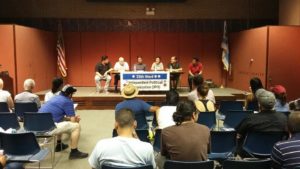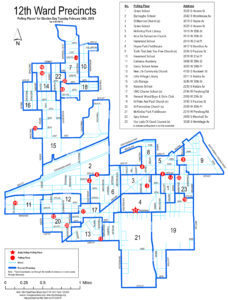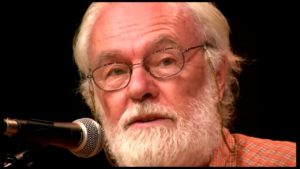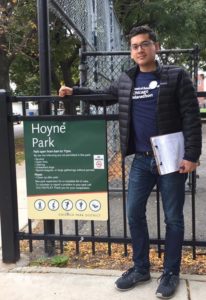Points delivered by Bill Drew at a gathering of IPOs on August 13th at Rudy Lozano Library. The featured speaker was Anna Rius a council woman from Terrassa which is near Barcelona, Spain. She is a member of Podemos, the broad political movement in opposition to Austerity.
- Our group is heavily oriented toward electoral politics. We have a special emphasis on developing a precinct structure which has been evident and effective particularly in the Mayoral/aldermanic race of 2014/15 and the 2016 primary.
 Our IPO is descendent of the legendary 22nd ward IPO. Draw inspiration from their principles and history. Rudy Senior is the father, Jesus is the son carrying out his work, and our señora de Guadalupe is the best precinct captain in Chicago, Lupe Lozano. We take their 3 letter acronym seriously – Independent, Political and Organized.
Our IPO is descendent of the legendary 22nd ward IPO. Draw inspiration from their principles and history. Rudy Senior is the father, Jesus is the son carrying out his work, and our señora de Guadalupe is the best precinct captain in Chicago, Lupe Lozano. We take their 3 letter acronym seriously – Independent, Political and Organized.- One key to our growth is a conscious effort to collect and cultivate dedicated campaigners – people who have strong ties with neighbors and family, people who are not involved for fame or personal gain. Mainly Latinos, mainly working class with a recent emphasis on youth. The place to find these members is in exactly the struggles – both electoral and around issues. Binding them into a group is done through periodic meetings, educational forums, social events, and issue organizing.
- We face 6 main challenges.
- Building strong cores in all 3 neighborhoods – McKinley Park, Brighton Park, and East Little Village.
- Including the most marginalized – non citizens particularly non English speakers, elderly, and disabled.
- Finding the right balance of activism around local issues versus broader policy and electoral issues
- Consistent functioning and communication because we are 100 per cent volunteer
- Developing close working relationships with kindred organizations – other IPOs as well as non profit advocacy groups.
- Candidate recruitment and training.

- To gain perspective is may be necessary to consider the nature of the present period. Make no mistake. We are in a time of DEFENDING the standards of living and democratic rights of our hard pressed neighborhoods. Like an army being relentlessly back by an advancing enemy, we always have to analyze where to re-group, stave off encirclements, and counter attack.
- Sometimes the period is defined as resisting austerity. Other times as countering neo-liberalism. These are useful categories. Defending democratic rights should be elevated as co-equal to these two concepts. School councils, police review and CAPS, electoral integrity, transparency, and accessibility to policy makers should be on our agenda.
- There is no need to concoct or divine the correct demand, the most winnable demand, nor the
“perfect” springboard to our access to localized power. It is not time to bemoan how apathetic and passive are the people. Look around. There is no end to issues and grievances which spontaneously arise in the populace. Our job is to plunge in and give what leadership we can. We do not have to be the organization that gets the credit. Other issue and neighborhood based organizations have far more capacity, expertise, and connections.  It is said (David Harvey) that the kinds of organization which arise reflects a direct response to the kinds of organization which has been created to control us. And in a chaotic, profit-driven system, those forms of control are constantly changing – even on a daily basis. In earlier times of more dominant mass industrial production and injustice, our people developed massive unions to resist. Now as we find ourselves increasingly in a gig economy, the forms of resistance are more localized. Now that the effort to squeeze us is coming more in the form of taxation and inequality of services and benefits. Coming more in violence, deportation, and neglect of those considered to be superfluous and unprofitable. We see organizations like Black Lives Matter, myriad expressions of resistance to deportations and depreciation of undocumented people, the mental health movement, trauma center, wage theft, privatization, environmental racism, school closings. IPOs don’t need to be the main organizers. We need to slip stream that momentum—publicize, give up our organizers, advocate with politicians, threaten electoral reprisals. https://www.jacobinmag.com/2016/07/david-harvey-neoliberalism-capitalism-labor-crisis-resistance/
It is said (David Harvey) that the kinds of organization which arise reflects a direct response to the kinds of organization which has been created to control us. And in a chaotic, profit-driven system, those forms of control are constantly changing – even on a daily basis. In earlier times of more dominant mass industrial production and injustice, our people developed massive unions to resist. Now as we find ourselves increasingly in a gig economy, the forms of resistance are more localized. Now that the effort to squeeze us is coming more in the form of taxation and inequality of services and benefits. Coming more in violence, deportation, and neglect of those considered to be superfluous and unprofitable. We see organizations like Black Lives Matter, myriad expressions of resistance to deportations and depreciation of undocumented people, the mental health movement, trauma center, wage theft, privatization, environmental racism, school closings. IPOs don’t need to be the main organizers. We need to slip stream that momentum—publicize, give up our organizers, advocate with politicians, threaten electoral reprisals. https://www.jacobinmag.com/2016/07/david-harvey-neoliberalism-capitalism-labor-crisis-resistance/- Neo-liberalism has more than 18 carat facets. All in the name of freedom for capital to achieve its yearly growth target – privatization, de-regulation, elimination of government services, financialization, globalism, concentration of ownership, division and picking on the weakest, rewards to political enablers. There is one other that we – the people on the ground – need to be award of: misdirection. The democratic tendency is still strong in our country. To pull the wool over our eyes, guys like Bill Clinton and Rahm have become experts at giving a penny with one hand and stealing a dollar with the other. We have to be astute to publicize and call out the plans which are devised to confuse and contuse.
- Minority nationalities are the bullseye of the neo liberal target. Effective resistance cannot be mounted unless we take on these attacks for what they are – a cataclysm of exclusion for people of color. In the political life of urban areas like Chicago, we have social and political forces which base their future on giving commercial and political leadership to minorities as minorities. They haven’t always sided with every progressive and/or working class cause. In times like now we have to build such a broad tent as to take advantage of what the center brings. By our expertise at the grass roots we can be the dog and not the tail.
- Learn from everyone. Mistakes are an essential part of learning. Coming up with the right approach is an iterative process. Adopt a line. Test it in practice. Tweak and repeat. Or junk it and rethink it.
- Unity of IPOs and all resistance organizations and stirrings is paramount. We have a good start – particularly as witnessed in our cooperation in Chuy’s campaign. Don’t let turf lines or lazy rivers separate us. Though each of the SW side wards has particular and different historical political, class, immigration, and nationality characteristics the plight of our residents is quite uniform.







